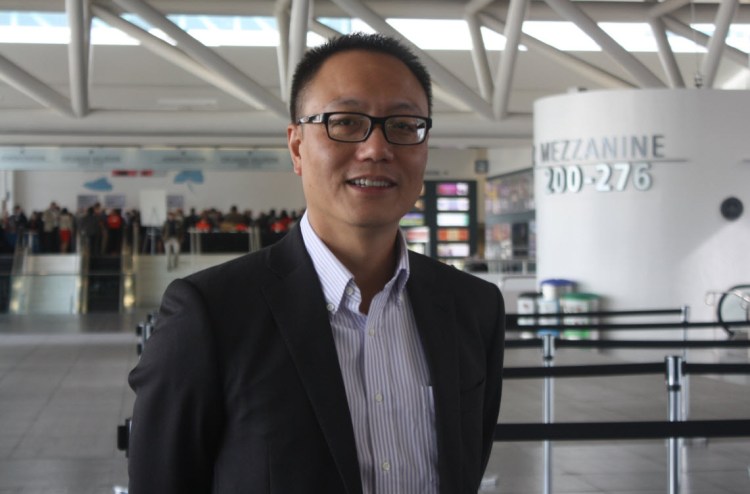Perfect World isn’t well known in the West, but in China, it is one of the powers that be among online game publishers. The company has more than 4,500 employees, making it larger than Zynga and not much smaller than Electronic Arts. It has grown huge thanks to its success with fantasy online role-playing massively multiplayer games that appeal to Chinese gamers.
But Robert Xiao, chief executive of the 15-year-old publicly traded Perfect World, isn’t content with that. And he’s making progress, with 30 percent of the company’s revenue now coming from international markets. We caught up with him at the recent Global Mobile Internet Conference in San Francisco, where he gave a speech on his heavy investments in mobile.
In the past few years, Perfect World has gone international with the acquisitions of American Runic Games, C&C Media in Japan, and Cryptic Studios in the U.S. That has given the companies game properties that appeal to Western gamers such as NeverWinter, Torchlight II, Blacklight Retribution, and Star Trek Online.
Now Xiao is making a calculated move into mobile games.
Here’s an edited transcript of our interview with Xiao.
GamesBeat: What’s the latest on your business? How big have you become?
Robert Xiao: For the past two quarters, we’ve been growing. The potential is still there. Momentum is still there. Business is going well in the U.S. and in China. About 4,500 employees. The biggest news lately is that we’re getting into the mobile space. We’ve had initial success in China. The U.S. is coming up. Mobile is a very important initiative globally.
GamesBeat: How long ago did you start heavily investing there?
Xiao: A year and a half ago. In China, we built two games, different types of games. We tried a racing game and a lighter kind of RPG. The most successful of these was Return of the Condor Heroes, a 3D turn-based RPG. We’re building more sophisticated 3D MMO games in the mobile space. The project is getting bigger and bigger, and so far we’re seeing more success. We’ll continue to invest there.
GamesBeat: Are they starting to look similar to PC MMOs?
Xiao: No, it’s still different, from two perspectives. First, the PC users’ time split is different from what mobile users do. I can spend an hour or two on the PC at night, but for mobile users, they’re spending much smaller chunks of time throughout the day. People spend bigger chunks at nighttime, but you still have to design the sessions to be smaller, shorter, and more intensive. Second, the user interface is totally different. Using a mouse and a keyboard is totally different compared to using a touch screen.
There are many other design issues. People’s purchasing behavior is different too. We’re developing more and more understanding of consumer behavior and building that into our design. The trend is to utilize our old IP in the online space, to revitalize those franchises, but even if the graphics are similar, the design is very different.
GamesBeat: How would you define success in the mobile market?
Xiao: Well, when we have a couple of games released and at the top of the charts, for Android and iOS, that would be one indicator. Revenue is another indicator, and the number of users, either DAU or cumulative accounts. For it’s probably the same as it is for everyone – chart ranking, revenue, and user base.
GamesBeat: A lot of companies have had different experiences migrating into mobile. Zynga had games that would get 50 or 100 million users on Facebook, but it got smaller numbers on mobile. They couldn’t get enough money out of it to justify dedicating large teams to mobile. That’s also partly why they fell behind on mobile – they always felt like they could make more money out of a Facebook game. But now we’re seeing things like Clash of Clans doing extremely well, perhaps better than a lot of console or PC games. The question then becomes, how do you marshal your resources so that you can make mobile into a bigger business?
Xiao: It’s twofold. Number one is role models like Clash of Clans. People wouldn’t have believed that could happen until they saw Clash of Clans. They wouldn’t believe it in the age of games making, say, $100,000 in revenue per month. But if you look at what happened in China, at this time last year, a mobile game producing 5 million renminbi a month would be a big game. At the end of last year, a couple of mobile games were making 10 million RMB a month. That excited people. It showed that if you put resources into these games, they could generate real money.
Early this year, very soon after, we saw a couple of games earning up to 30 million RMB per month, and soon enough after that, they broke 50 million. That’s what you call a trend. [laughs] Luckily enough, we weren’t the earliest out there, but we weren’t too late. We started to invest gradually, because we do believe that mobile is a trend.
The same rules apply here as in any other business. If you have more people coming in, there’s always a chance to earn more money. The investment is not the key. The key is, if you invest a certain amount of money, can you attract a big enough cloud of users? If you do, then you have a way to make money from them. We see the potential for more and more people getting into the mobile space, people with disposable income. We believe there’s a lot of average revenue per paying user (ARPPU) in there. Furthermore, we believe we have the capability to build suitable games. With our technical and artistic expertise and our design capability, with our understanding of the consumer, we can build games for these people, and we can draw more people to join us.
Because of all this, we believe we should invest ahead of the curve, and we’ve been doing that. We’re starting to see some return, and we’re going to invest more in hopes of a bigger return in the future.
GamesBeat: Do you foresee this becoming a certain percentage of your business, or engaging a certain percentage of your employees?
Xiao: It’s hard to say at this stage. We’re going to grow it as big as we can. Of course, we’re not blindly pouring every available dollar into this. We’re gradually investing and we’ll see what kind of returns we can get. It should reach a significant portion of our business within two years.



